August Wilson’s Century Cycle
August Wilson is most known for his Century Cycle (also called The Pittsburgh Cycle), a collection of ten plays that span across decades to document African American experiences in the 20th century. The plays chronicle the effect of social and historical situations of each decade on individual characters. All but one of the plays take place in the Hill District of Pittsburgh, Pennsylvania, an area that consists of historical black neighborhoods. The Hill District has been made well known on the national stage by Wilson, who himself lived there for a time in his childhood and would regularly return to visit, as well as for its cultural significance, economic decline, and for the impact that the 1968 Pittsburgh riots had on the neighborhood as well.
Wilson wrote the plays out of order, so while the publication/premiere dates vary greatly amongst them all, the chronological order is as follows:
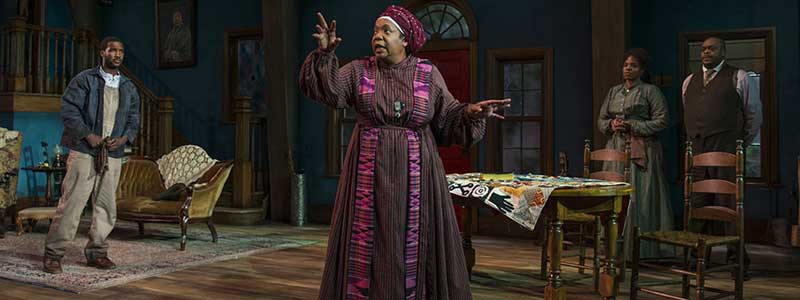
Photo of Jerod Haynes, Jacqueline Williams, Tyla Abercrumbie, and A.C. Smith in GEM OF THE OCEAN by Michael Brosilow.
Written in 2003, the play takes place in 1904. Citizen Barlow flees Alabama and goes to Pittsburgh in search of a different life. He visits Aunt Ester, a woman rumored to be 285 years old and who possess healing powers. She guides him on a spiritual journey, sending him to the City of Bones, a city in the Atlantic Ocean built from the bones of Africans who died on slave ships. Aunt Ester’s lessons shape Citizen’s actions near the end of the play when tragedy strikes and he is faced with an important decision.
Joe Turner’s Come and Gone
Written in 1988, the play takes place in a Pittsburgh boarding house in 1917. For historical context, the Great Migration of the 1910s was occurring, descendants of former slaves moving from the South to the industrial cities of the North in pursuit of new jobs and new lives. In the play, Seth and Bertha Holly run a boarding house where these travelers could rest on their journey to the North. Herald Loomis arrives at the boarding house with his daughter Zonia in search of his wife Martha. Joe Turner refers to the bounty hunter who illegally enslaved Herald; horrific memories of the man haunt Herald during his journey. At the boarding house, Herald meets a variety of characters who represent different generations and personal histories. One such character is Bynum Walker, who helps him see that he is really searching for his own identity.
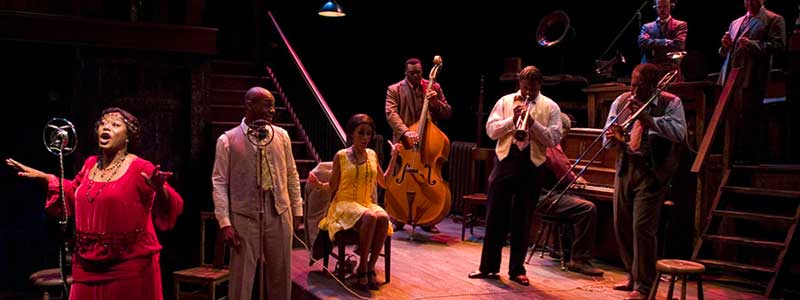
Photo of Greta Oglesby, Kelvin Roston Jr., Kristy Johnson, A.C. Smith, James T. Alfred, Alfred H. Wilson, Cedric Young, Thomas J. Cox and Stephen Spencer MA RAINEY’S BLACK BOTTOM by Michael Brosilow.
Written in 1982, the play takes place in 1927 in a Chicago recording studio, the only play in the Cycle that does not take place in Pittsburgh. Tensions between Ma Rainey’s blues band and the white studio owners, as well as within the band itself, escalate as the creatives are pitted against one another and rebel against the exploitation of the music producers. It is inspired by the real life of Gertrude “Ma” Rainey, a professional blues singer known as the “Mother of Blues”.
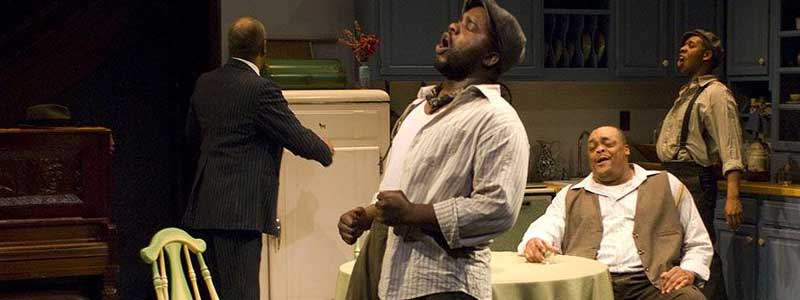
Photo of Alfred H. Wilson, Ronald L. Conner, A.C. Smith, and Brian Weddington in THE PIANO LESSON by Michael Brosilow.
Written in 1987, the play takes place in Pittsburgh in 1936, during the aftermath of the Great Depression. The play follows the Charles family and the arguments of siblings Berniece and Boy Willie over the fate of their old family piano, an object that symbolizes history and learning from ancestral legacies. The play won a Pulitzer prize and New York Drama Critics’ Circle Award.
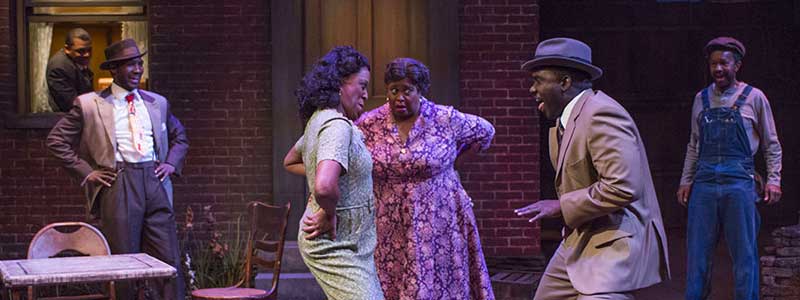
Photo of Kelvin Roston Jr., Jerod Haynes, Ebony Wimbs Felicia P. Fields, Ronald L. Conner, and Allen Gilmore in SEVEN GUITARS by Michael Brosilow.
Written in 1995, the play takes place in 1948. It starts with the aftermath of the funeral of Floyd “Schoolboy” Barton and then quickly launches backward in time, weeks before his death. Floyd is released from prison and is looking to move from Pittsburgh to Chicago after a recording studio there expresses interest in him due to his recent musical success. However, he pawned his guitar for money and now needs to get it back before leaving. He works to get a band together, reconcile with his girlfriend Vera, and find money to get his guitar back, but the latter in particular proves difficult as he is met with barrier after barrier. The play details events that lead up to Floyd’s death, ending again at the funeral of Floyd where his friends are reminiscing and a revelation even they are not aware of about his death.
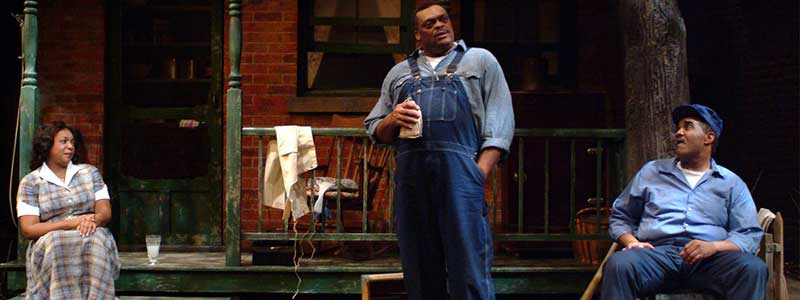
Photo of Jacqueline Williams, A.C. Smith, and John Steven Crowley in FENCES by Michael Brosilow.
First performed in 1983, the play takes place in 1957. Troy Maxson was a talented baseball player but never had the opportunity to make into a professional career as major baseball leagues do not accept black players. After some time in prison, Troy works as a garbage collector, the first black man to drive the garbage truck in the city. His family consists of his wife Rose, sons Lyons and Cory, brother Gabe, best friend Bono, mistress Alberta, and, toward the end of the play, baby daughter Raynell. Troy drinks and bitterly reminisces about his past and the injustices he faces. He scolds Lyons for his dreams of being a musician and refuses to let Cory pursue a football scholarship as he harbors resentment for his own lost opportunity. Family tensions arise and are ultimately addressed in this tale of forgiveness, prejudice, bitterness, and love. The play won a Pulitzer Prize, Tony Award, and numerous other accolades. A film adaptation starring Denzel Washington and Viola Davis was released in 2016 to acclaim.
First performed in 1990, the play is set in a diner in 1969, a period that features the civil rights movement and the rise of the Black Power movement, as mentioned within the text. The work examines the effect of such times on individuals still stuck in place and downtrodden, confronted by continued injustice. Hill District residents gather to talk about their realities, from recent demonstrations to looking for work. Memphis is faced with a decision to sell the diner, as the entire city is subjected to growing gentrification.
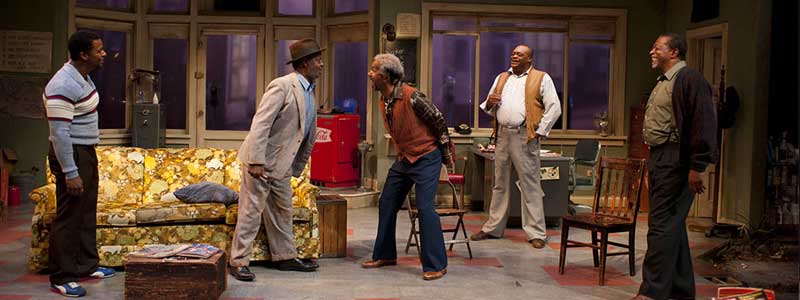
Photo of Kamal Angelo Boldon, Alfred H. Wilson, Allen Gilmore, A.C. Smith, and Cedric Young in JITNEY by Michael Brosilow.
First performed in 1982, the play is set in 1977 in a Pittsburgh cab station. The city is shutting down businesses during a time when gentrification has seized not only Pittsburgh, but the entire country. The cab station is one such business under threat. The play follows the personal struggles of five cab drivers as their jobs and futures are threatened. It premiered on Broadway in 2017 to acclaim.
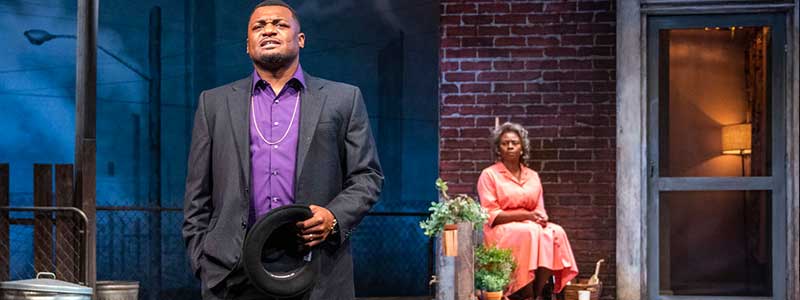
Photo of Kelvin Roston, Jr. and TayLar in KING HEDLEY II by Michael Brosilow.
Written in 1999, the play takes place in 1985. It follows King Hedley II, son of Ruby and the spiritual son of Hedley from Seven Guitars, as he tries to carve out a living selling stolen refrigerators after seven years in prison.
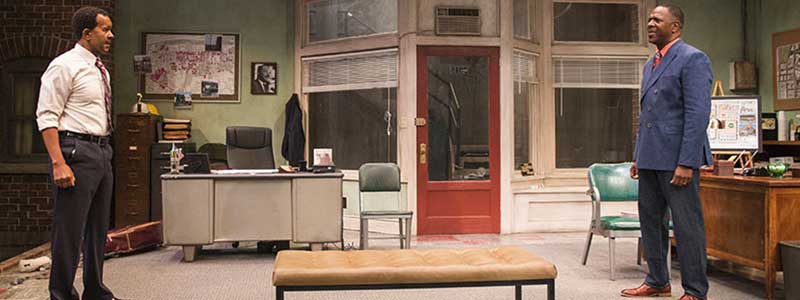
Photo of Allen Gilmore and James Vincent Meredith in RADIO GOLF by Michael Brosilow.
First performed in 2005, the play takes place in 1997. Harmond Wilks is a real estate developer dedicated to becoming the first black mayor of Pittsburgh as he envisions reviving the Hill District. However, he begins to question his mission when learning of the risk such change poses to the neighborhood’s vital history.
Numerous characters reappear throughout the cycle, though stories portrayed are not always directly connected. Wilson is lauded for his significant contributions to American theatre, and all works in the Century Cycle remain pertinent and relevant, years after the playwright’s death.
Don’t miss Court’s 9th production in Wilson’s American Century Cycle. Two Trains Running begins May 13, 2022 →